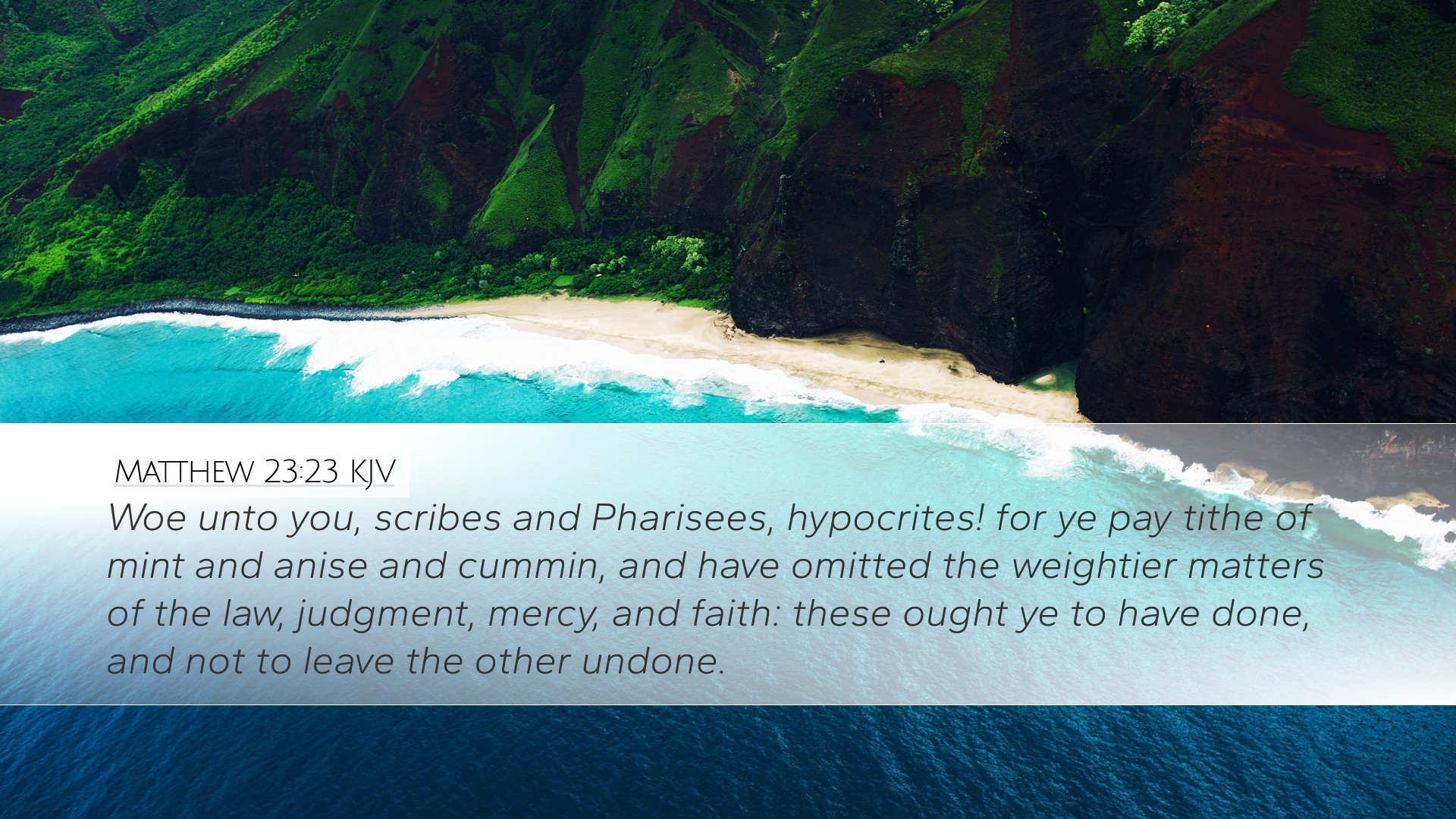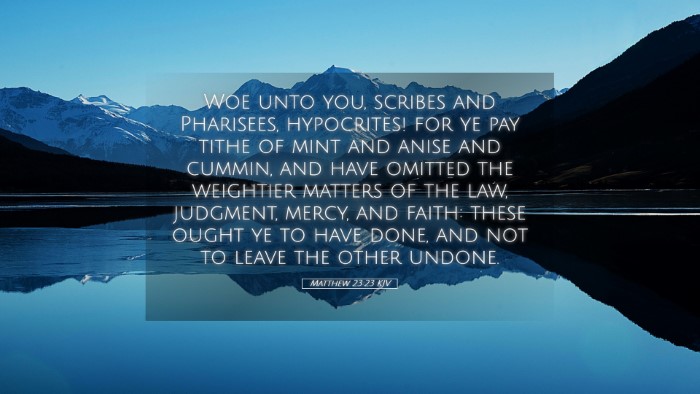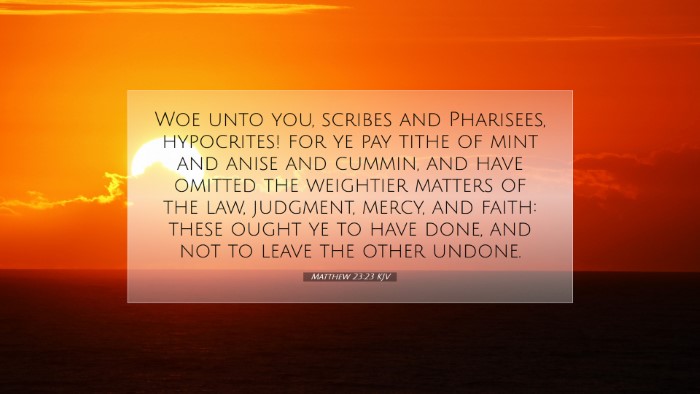Commentary on Matthew 23:23
Verse: "Woe to you, scribes and Pharisees, hypocrites! For you pay tithe of mint and anise and cummin, and have neglected the weightier matters of the law: justice and mercy and faith. These you ought to have done, without leaving the others undone." (Matthew 23:23, NKJV)
Introduction
This verse is part of a series of rebukes delivered by Jesus to the religious leaders of His time, particularly the scribes and Pharisees. The significance of this passage lies in its emphatic distinction between external religious observance and the internal moral and ethical standards required by God. The insights extracted from various public domain commentaries provide a profound understanding relevant to pastors, students, theologians, and scholars alike.
Overview of the Context
The context of Matthew 23 presents Jesus’ public denouncement of the hypocrisy of the religious elite. In the surrounding verses, He pronounces "woes" against the scribes and Pharisees, revealing their failure to lead the people faithfully. Here, in verse 23, He highlights their meticulousness in minor issues while neglecting fundamental principles.
Matthew Henry’s Commentary
Attention to Detail vs. Neglect of Core Values: Matthew Henry emphasizes that the Pharisees’ dedication to tithing even the smallest herbs is commendable in precision, but their neglect of justice, mercy, and faith renders their efforts futile. He notes that strict legal adherence does not compensate for the disregard of foundational virtues. This serves as a profound lesson about prioritizing God’s heart over mere rule-following.
Nature of True Worship: Henry further argues that true worship involves not just outward conformity but a heart aligned with God's principles. Worship cannot be reduced to rituals alone but must encompass the weighty matters of the law which reflect God’s character.
Albert Barnes’ Commentary
Legalism Critique: Albert Barnes points out that Jesus uses sarcasm to illustrate the absurdity of the Pharisaical practices. By focusing on minute details of the law, they fail to comprehend the broader ethical implications inherent in the Law of Moses. Barnes suggests that this is an example of how legalistic observance blinds one to the essential moral duties encapsulated in love, justice, and mercy.
Call to Balance: Barnes emphasizes that Christ does not denounce tithing itself but criticizes the imbalance wherein minor aspects of the law are exaggerated while neglecting what is truly important. The heart of the law lies in moral integrity, which should not be overshadowed by the less significant details of religious observance.
Adam Clarke’s Commentary
The Weightier Matters of the Law: Clarke elaborates on what the "weightier matters" might involve—this includes the virtues of equity, compassion and faithfulness. He argues that these represent the essence of divine law and that neglecting them constitutes not just a failure in practice, but a misunderstanding of God’s will.
Interconnection of Ritual and Ethics: Clarke suggests that the Jewish leaders bundled their righteousness with rituals rather than ethics, leading to a skewed perspective on what pleases God. He encourages readers to see both aspects as necessary yet warns against prioritizing rituals to the detriment of ethical living.
Theological Implications
This passage has profound implications for contemporary Christian faith and practice. It challenges adherents to assess their spirituality critically, questioning whether they embody the justice, mercy, and faith that God desires.
- The Deeper Understanding of Righteousness: Righteousness is not merely about adhering to rules but living a life characterized by love and integrity.
- The Unity of Law and Love: True obedience to God involves a holistic approach where both worship and ethical behavior are in harmony.
- The Awareness of Hypocrisy: The warning against hypocrisy remains relevant today; believers are called to examine their lives to ensure congruence between belief and practice.
Practical Applications
For pastors and teachers, this text serves as a reminder to focus on teaching the heart of the law, rather than mere obedience to rules. While doctrines and rituals are important, the transformation of the heart through love, justice, and mercy must be the goal of all ministry endeavors.
For Christians:
Self-Examination: Believers are encouraged to assess their own lives. Are they caught up in practices that lack the spirit behind them? This verse calls for humility and a return to the core tenets of faith that prioritize love and service.
For Theologians:
Engagement with Current Issues: The weighty matters of justice and mercy are as crucial today as they were in Jesus' time. Theological discourse surrounding social justice, mercy ministries, and advocacy is illuminated through this text.
Conclusion
The verse Matthew 23:23 stands not only as a rebuke to the scribes and Pharisees of the past but as an enduring directive for all believers. In recognizing the importance of justice, mercy, and faith, Christians are encouraged to cultivate an authentic representation of faith that aligns with God’s heart. Through understanding the scriptures deeply, the church can engage the world more effectively, demonstrating the transformative power of living in accordance with these weighty matters.


